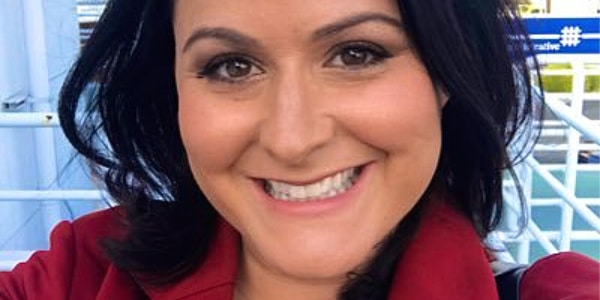Janine Jackson interviewed Free Press’s Jessica González about Trump’s FCC for the April 4, 2025, episode of CounterSpin. This is a lightly edited transcript.
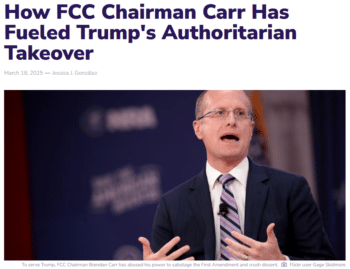
Free Press (3/18/25)
Janine Jackson: There are reasons that the FCC, the Federal Communications Commission, is an opaque entity for many people. The fact that there is a federal agency setting the terms for media companies’ operations conflicts with many Americans’ understanding of the press corps as a group of brave, independent individuals looking to tell the truth, and let the chips fall where they may.
There are, in fact, many community-supported, differently structured news outlets doing just that. But, listeners know, the big major papers and stations and channels we may look to for news are owned and sponsored by big profit-driven corporations that share the status quo—supporting interests of other big profit-driven corporations.
In allowing these companies’ increased conglomeration, and sidelining their nominal public interest obligations, the FCC has long played a role in determining whose voices are heard and whose are not. But maybe not quite as loud, as proudly prejudiced and bare-knuckled a role as right now.
Our guest reports how Trump’s appointed FCC chair, Brendan Carr, has got straight to dangerous work, undermining free speech and press freedom right out of the gate. Jessica González is co-CEO at the public advocacy group Free Press. She joins us now by phone from Los Angeles. Welcome back to CounterSpin, Jessica González.
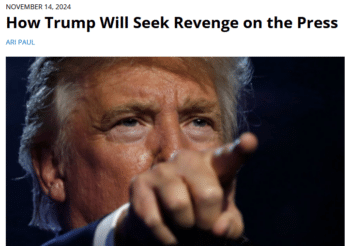
FAIR.org (11/14/24)
Jessica González: Thanks for having me, Janine.
JJ: As you have noted, Brendan Carr is not so much regulating as delivering on Trump’s threats to punish anyone who reports critically about him, including by giving any space to anyone who opposes him politically. It’s beyond the beyond, and we see there’s no piece of government that MAGA will not weaponize.
And so appeals to gentility, and “let’s agree to disagree,” are just not serving the public, not serving marginalized communities or democracy, even a little bit.
So what do you have your eye on right now? What should we know is not “maybe going to happen” with a Trump-led FCC, but actually happening?
JG: You know, Janine, I remember 10, 15 years ago when the concerns we had about the FCC were structural in nature. They were allowing runaway media consolidation, which was resulting in fewer voices, and particularly fewer voices of color, controlling the narratives that we were hearing on broadcast media. Or we were concerned about net neutrality, making sure that internet service providers were not allowed to stop or slow down the traffic online, so that everyone had an equal opportunity to be heard. These, of course, were free speech issues, but they weren’t quite as in-focus threats to free expression as what we’re seeing now out of the Brendan Carr FCC under Donald Trump.
Brendan Carr has systematically gone after broadcasters who have given Trump’s political opponents airtime, or who have factchecked the president. For instance, in his first week in office, he revived three o
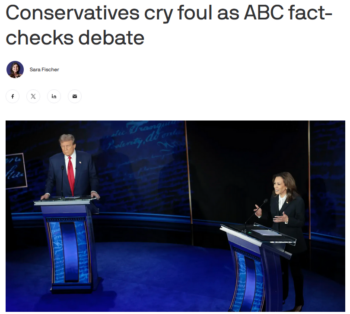
Axios (9/11/24)
ut of the four claims against broadcasters that the FCC chair under Biden had dismissed as politically biased. He left in place the dismissal of a complaint against Fox News, and revitalized the complaints against ABC, NBC and CBS, under claims that are specious, to say the least.
It’s very clear that his intent is to punish broadcasters who have broadcast opposing viewpoints—in ABC‘s case, factchecked the president at a debate before the election, in CBS’s case, they aired on 60 Minutes a recording of Kamala Harris that was edited as per normal standards in broadcast. We saw Brendan Carr going after NBC when they aired an SNL segment with Kamala Harris, even though they gave the president airtime the next day during a NASCAR race. This appears to be a clear and systematic effort to weaponize the FCC against broadcasters whose political speech, or just their news reporting, the president and his allies don’t like.
Another case in San Francisco is an investigation that the FCC chair has opened into KCBS radio station, where he is complaining that KCBS aired information about an ICE raid that was happening in the area. This is clearly First Amendment‒protected speech that these broadcasters are—you know, we expect them to cover the news, that’s presumably part of a public interest obligation. But the FCC chair is going after any political speech or any news reporting or any speech, frankly, that the president and his allies don’t like.
This is chilling. We heard from FCC commissioner Anna Gomez, who’s a Democrat, that she has visited radio and television broadcasters across the country, and is already hearing that they are directing the reporters to be careful, because they fear government retribution for their speech. And this is exactly the type of environment where authoritarianism thrives. Not only is Brendan Carr going after broadcasters, which are clearly regulated entities under the FCC’s scope of work, he’s also, in his diatribe in Project 2025, threatened to go after social media companies, and forced them to leave up hate and lies.
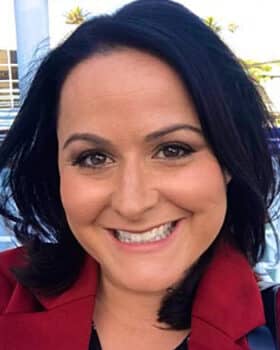
Jessica Gonzalez: “They are directing the reporters to be careful, because they fear government retribution for their speech.”
So this is an all-out war on the First Amendment. It’s chilling. And this is the type of stuff that our allies in Hungary tell us they were seeing before Orban took power. A couple weeks ago, we had a convening with András Biró-Nagy from Hungary, and Maria Ressa from the Philippines, who tracked Duterte’s authoritarian takeover of the government, and they were pointing out how similar the attacks on free speech in the United States look to the attacks on free speech in their countries, the similar tactics of quashing dissent, dehumanizing people, of going after minority groups. This is really clearly giving us great concern.
JJ: I will just say, finally, and thank you, we are gripping on with our fingernails, and thank you for acknowledging lessons from other places. We’re so committed to U.S. exceptionalism, but we actually need to be listening to other countries right now.
But if we are dreaming, if we are not just trying to hold on to scraps, are there policies, is there legislation, is there a vision that we can be looking to as a template, imagining that we are surviving this moment?
JG: Yeah, I mean, I imagine we are surviving this moment, and I’m looking to what you’re doing, Janine, and what thousands of other reporters are doing throughout the country, to hold the power to account, be a Fourth Estate. And we’re looking at state policies, and maybe one day federal policies, to expand community journalism, noncommercial journalism that is not relying on moneyed interest to call the shots, that’s really just helping people understand what is happening when people take action when they don’t like what they see.
And so we have, with the Media Power Collaborative that Free Press is helping convene, and with the Media 2070 project that my colleagues are convening as well, that holds attacks on communities of color to account, and that repairs the harm that’s being done, not just now, but that historically has been done through our media system, what does it look like? This is what the Media 2070 project is queuing up for us. What does it look like to have a media system that loves Black people? The Media Power Collaborative is really looking at state-based policies to make sure that there is more public money for noncommercial journalism.
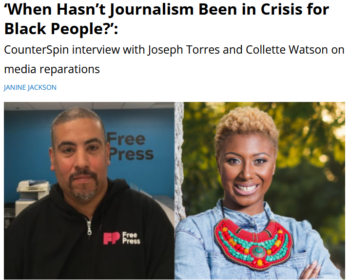
FAIR.org (5/3/24)
And so these are the types of models that are infusing new reporters on the ground. There was a bill in California that actually didn’t pass, but there was a budget line item for $25 million that went to UC Berkeley here. And we have local reporters embedding inside of newsrooms that are covering city halls, that are covering the state house. This is bringing much-needed capacity to track what’s actually happening in local civics to participate in our democracy.
JJ: All right, I’m going to end right on that note. We’ve been speaking with Jessica González; she’s co-CEO at Free Press. They’re online at FreePress.net. Jessica González, thank you so much for joining us this week on CounterSpin.
JG: Thanks for having me, Janine.

